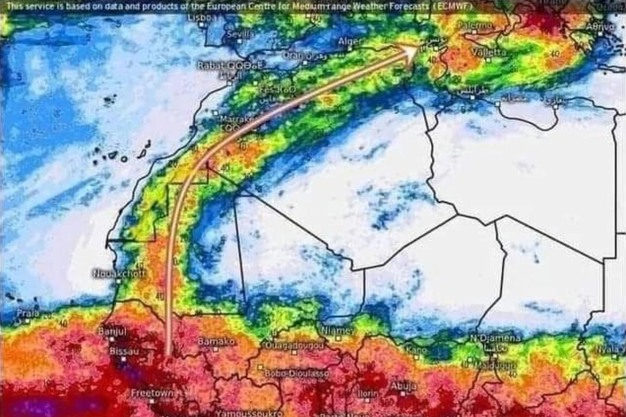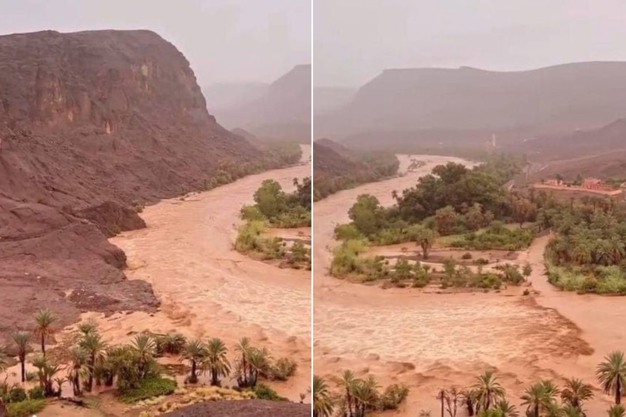Over the past few weeks, south-east Morocco has experienced a series of exceptional floods. The human and material toll has been heavy: many people have been killed or reported missing, and houses, oases, and plantations have been swept away by the floods. Anas Mansouri, an expert in dryland irrigation, explains what happened and the consequences for the agricultural sector.
Exceptional events, but no longer rare
Mansouri reports: "Recently, the south-eastern region of Morocco has been hit by major flooding, often caused by torrential rains resulting from unstable weather systems, events that have become increasingly frequent due to climate change. These floods caused significant material damage, affecting road infrastructure and submerging farms, resulting in considerable economic losses, particularly for sensitive crops such as vegetables. On the other hand, the rainfall replenished the reserves of the region's dams, notably the Kadoussa, Moulay Youssef, and Ait Ouara dams. The region's hydrological map has been altered, with areas of increased saturation, requiring integrated water resource management to strengthen community resilience to these increasingly frequent climatic events."

Despite the lack of rainfall in the region in recent years, Mansouri believes that flooding should no longer be considered a rare event: "These rains testify to a trend towards the intensification of extreme weather phenomena, exacerbated by climate change, which is modifying rainfall patterns and increasing the frequency and intensity of extreme weather events in the region".
Heavy human and material toll, growers particularly impacted
According to Mansouri, the toll is heavy: "The damage is considerable, seriously affecting road infrastructures, which have been cut off or destroyed, rendering certain areas inaccessible. Many houses were also damaged or destroyed, displacing populations. Agricultural land, mainly dedicated to crops such as vegetables and fruit trees at this time of year, suffered significant losses due to saturation and soil erosion. The costs involved in repairing infrastructure and assisting disaster victims are high, putting a strain on the response capacities of local authorities and humanitarian organizations. The economic impact is significant, as rural communities depend heavily on agriculture for their livelihoods."
Which crops are most affected? Mansouri replies, "We're talking mainly about date palms, walnuts, apples, almonds, olive trees, and vegetables. These crops, emblematic of the region, are particularly vulnerable to excess water, which can lead to significant crop losses. Soil saturation has severely affected production, compromising local food security and farmers' incomes."

Regeneration of dam reserves
Despite the losses, the floods are in their own water resources in a region most severely affected by drought, where rain has not fallen for over six years. Mansouri says, "Recent rainfall in south-east Morocco has enabled significant regeneration of dam reserves, playing a crucial role in the region's water management. Among these dams, the Kadoussa dam, near Boudnib is particularly important, as is the Hassan Addakhil dam in Errachidia, which supplies water for agriculture and domestic needs. The Mansour Eddahbi dam in Ouarzazate and the Abdelmoumen dam, are also essential in helping to regulate water resources. In addition, the Tislit dam, near Tata, plays a key role in this semi-arid region."
The expert concludes: "The rainfall has increased the water levels in these dams, but it has also altered the region's hydrological map. Increased soil saturation can lead to resource management problems, including the risk of overflow and soil erosion. It is therefore essential to adopt an integrated approach to water resource management, considering not only current needs but also the potential impacts of extreme climatic events in the future. This involves strategies for conservation, infrastructure improvement, and community awareness-raising to build resilience in the face of water-related challenges. Proactive management is essential to ensure the sustainability of water resources in this vulnerable region."
For more information:
Anas Mansouri
RDI Maroc
Tel: +212 669-983750
Email: a.mansouri@rdimaroc.org
www.rdimaroc.org
www.linkedin.com/in/anas-mansouri-722094130
